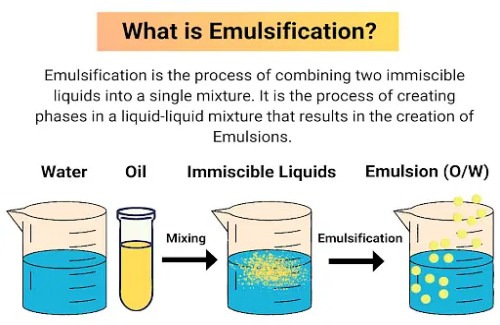Using Emulsifier In Food to Perfect Plating Style
All Regarding the Duty of an Emulsifier in Food and Its Relevance in Modern Food
Emulsifiers are pivotal in contemporary food, promoting the mix of immiscible liquids like oil and water. Their ability to stabilize combinations improves the structure and taste of different foodstuff. From salad dressings to baked products, emulsifiers play a substantial duty in both business and home food preparation. Yet, the scientific research behind their feature and the future technologies in their usage stay much less checked out. Emulsifier In Food. What more could be unearthed about these essential culinary representatives?
Recognizing Emulsification: The Science Behind the Process
Emulsification may seem like a basic cooking technique, it involves complex scientific principles that are essential for creating secure mixtures of immiscible fluids, such as oil and water. At the heart of this procedure lies the concept of surface area stress, which stops the two fluids from blending normally. Emulsifiers, compounds that decrease surface area stress, play a vital duty in promoting the mix of these liquids. They have both hydrophilic (water-attracting) and hydrophobic (water-repelling) residential properties, permitting them to anchor themselves at the user interface in between oil and water.
When an emulsifier is introduced and the combination is flustered, it creates a protective obstacle around dispersed droplets of one liquid within the other, supporting the mix. This activity not only improves appearance and mouthfeel in food yet also adds to their aesthetic appeal. Emulsifier In Food. Recognizing the science behind emulsification is basic in modern cuisine, allowing chefs to develop a variety of sauces, dressings, and emulsified meals
Typical Sorts Of Emulsifiers Used in Food
Emulsifiers are vital ingredients in the food market, playing an important role in supporting blends of oil and water. Numerous sorts of emulsifiers are frequently utilized, each with distinct residential properties matched for various applications. Lecithin, acquired from soybeans or egg yolks, is one of one of the most prominent natural emulsifiers, typically discovered in delicious chocolates and dressings. Mono- and diglycerides, which are acquired from glycerol and fats, are commonly made use of in baked items and margarine to improve appearance and expand life span. One more usual emulsifier is polysorbate 80, favored for its capability to improve the uniformity of gelato and sauces. Furthermore, xanthan gum and guar periodontal act as thickening representatives that likewise add to emulsification in gluten-free items. These emulsifiers are essential to producing a secure, tasty product in modern-day food solutions, making sure a positive sensory experience for customers.
The Role of Emulsifiers in Different Food Products
A variety of food rely upon emulsifiers to achieve preferred structures and stability. These compounds promote the blending of immiscible liquids, such as oil and water, which is important in lots of processed foods. In salad dressings, emulsifiers aid maintain a consistent mix, protecting against separation and boosting rack life. In baked items, they add to an uniform crumb framework and wetness retention, boosting overall top quality.
Emulsifiers also play a significant duty in dairy products, such as ice lotion and yogurt, where they maintain fat blobs, making certain a smooth mouthfeel. Furthermore, in sauces and dressings, they enhance thickness and enhance spreadability. This functionality is important in the production of chocolates, margarine, and mayo, where a cohesive item is required. In general, using emulsifiers in numerous food is integral to modern-day food production, boosting stability and consistency throughout a wide variety of products.
Just How Emulsifiers Enhance Appearance and Taste

When incorporated right into food, emulsifiers substantially boost both texture and flavor, developing an even more enjoyable consuming experience. These compounds assist in the blending of components that typically do not blend well, such as oil and water, hop over to these guys causing a smoother, creamier uniformity. This not only boosts mouthfeel but additionally allows tastes to spread uniformly throughout the item, amplifying the total taste.
:max_bytes(150000):strip_icc()/Emulsify-58add64f3df78c345bdef91d.jpg)
Emulsifiers in Home Food Preparation: Tips and Techniques
How can home cooks efficiently utilize emulsifiers to improve their recipes? Emulsifiers play an essential duty in achieving More hints desirable structures and tastes in homemade dishes. For circumstances, using egg yolks in mayonnaise or hollandaise sauce enables a stable emulsion, incorporating oil and water efficiently. Home chefs can likewise try out mustard, which acts as an emulsifier in vinaigrettes, making sure a smooth uniformity.
In baking, integrating lecithin, located in egg yolks or soy, can enhance dough stability and moisture retention. In addition, making use of industrial emulsifiers like xanthan gum or guar periodontal can help thicken sauces and dressings while preserving a luscious mouthfeel.
When producing ice creams or whipped garnishes, emulsifiers can prevent ice crystal development, leading to a smoother texture. By mastering these strategies, home chefs can significantly boost their culinary developments, providing regular and satisfying meals that showcase the power of emulsification.
The Future of Emulsifiers in Culinary Innovation
As the cooking globe continues to evolve, the duty of emulsifiers is positioned to come to be progressively ingenious and varied. Advances in food scientific research are bring about the growth of new emulsifying agents originated from natural resources, which accommodate health-conscious consumers and improve the sensory qualities of dishes. Developments such as plant-based emulsifiers are obtaining traction, allowing cooks to produce vegan and allergen-free choices without endangering texture or flavor.
In addition, using emulsifiers in molecular gastronomy is expanding, allowing cooks to experiment with unique structures and discussions that mesmerize diners. As sustainability comes to be a priority, the future might see a shift towards green emulsifiers that reduce environmental impact.
Inevitably, emulsifiers will certainly continue to play an essential function in culinary advancement, bridging the gap in between practice and modernity, and enabling cooks to press the borders of creative thinking in their cooking areas.
Often Asked Concerns

Are Emulsifiers Safe for Individuals With Allergies?
Emulsifiers can be risk-free for individuals with allergies, relying on their specific level of sensitivities. Nevertheless, certain emulsifiers, originated from allergenic resources like soy or eggs, might activate reactions, requiring mindful active ingredient scrutiny and consultation with medical care specialists.
How Do Emulsifiers Influence Food Life Span?
Emulsifiers boost food shelf life by supporting mixtures, preventing splitting up, and minimizing microbial growth. This security helps keep appearance and taste gradually, allowing products to continue to be appealing and risk-free for consumption longer than without emulsifiers.
Can Emulsifiers Be Derived From Natural Sources?
Yes, emulsifiers can be stemmed from natural sources such as plants, eggs, and milk products (Emulsifier In Food). These all-natural emulsifiers assist stabilize combinations, boosting appearance and consistency in various food applications while being favored for health-conscious consumers
What Are the Ecological Effects of Emulsifier Production?
The environmental influences of emulsifier production include source deficiency, habitat devastation, and contamination from artificial procedures. Natural emulsifier sourcing can minimize some impacts, yet generally, commercial techniques still posture significant environmental difficulties to communities worldwide.

Exist Vegan Emulsifiers Available out there?
Yes, there are several vegan emulsifiers offered on the market, such as lecithin derived from soy or sunflower, guar gum, try this website and xanthan gum tissue. These alternatives deal with plant-based diets without endangering emulsifying residential properties.
Emulsifiers are vital active ingredients in the food market, playing a crucial role in supporting combinations of oil and water. A selection of food products depend on emulsifiers to attain wanted appearances and security. When incorporated right into food items, emulsifiers significantly enhance both structure and taste, producing a more enjoyable consuming experience. In addition, emulsifiers can maintain air pockets in whipped products like lotions and mousses, leading to a light and ventilated texture. Emulsifiers enhance food shelf life by stabilizing blends, avoiding splitting up, and decreasing microbial development.